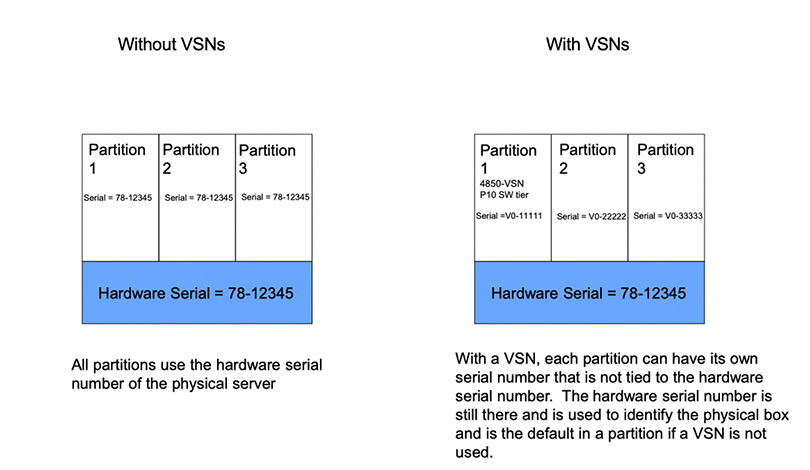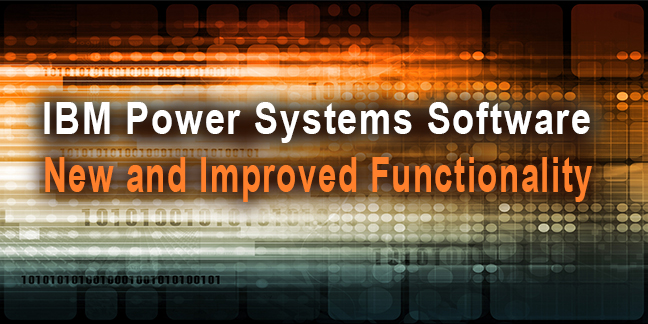Ron Gordon
Director, IBM Power Systems
IBM Power Systems development teams have been making some great changes over the past several months that you may not have heard of yet. While most of these product changes affect AIX, IBM i, and Linux with better system management and enhanced systems functionality, these new features and functions will have an overall effect of workload cost optimization. I will give a brief overview of many of these, and for more information, you can always contact me or a Mainline representative – or even Google.
Virtual Serial Number for IBM i: IBM i is licensed to individual systems based on the serial number of the IBM Power System. If you wish to permanently relocate the IBM i license to another server within the Enterprise, this is accomplished by doing a license transfer, provided the transfer is to the same “P” class system. There is a fee for this. This historical process is managed by the HMC when you create a partition. The partition will be designated as an IBM i partition and the serial number of that server will be associated with IBM i when loaded into the partition. (Note: temporary relocation for no charge is possible for hardware maintenance and other situations, and the temporary grace period is valid for 70 days before it must be returned to the originating server where the original serial is). IBM i has now announced Virtual Serial Numbers for IBM i instances. Using this new capability, an IBM i license can have a virtual serial number that moves with the image and customer can relocate LPM IBM i partitions between IBM Power Systems of the same “P” class within the Enterprise for no charge. This VSN is independent of the serial number of the physical server.

So how do I enable Virtual Serial Numbers? The steps are as follows:
1. On an existing or new POWER9 or POWER10 machine, order FC #EVSN with the number of VSNs desired to acquire VSNs for the machine. There is a minor charge for each VSN.
- Order fulfills on Entitled System Support (ESS). Next available VSNs are reserved based on ordered quantity.
- End result:
- a VET code (also called “activation code”) is available to install on the Power machine on which #EVSN order was placed
- IBM inventory records are created for the VSNs
2. Client installs VET code on their Power machine. Result: the reserved VSNs (from step #1) are available on the machine.
3. Create an IBM i partition and assign a VSN to that partition.
4. Retrieve the VSN from inventory, then order IBM i portfolio software on (or transfer IBM i, for the IBM i transfer fee, to) the VSN.
There are some requirements and restrictions: This only applies to POWER9 and POWER10 systems; firmware and HMC have to be at the supported level; VSNs cannot be applied to a running IBM i partition; VSNs do not support transfers to different “P” class machines; VSNs cannot be used in PowerVS by PowerVS users while VSNs can support the hybrid cloud environment on the on-prem Power System.
New Software Maintenance Agreement (SWMA) and Expert Care Changes:
Historically, Power software and Expert Care were offered with 1 and 3 years terms. While this was good, many companies needed a more granular option to meet their internal financial requirements and reduce renewals for additional time, which were sometimes forgotten, causing support issues. Now SWMA has added 2, 4, and 5 years options so at ordering, customers can choose SWMA for 1, 2, 3, 4, or 5 year duration. Additionally, Expert Care, which provides additional SW and Hardware support functions beyond defect support, has added 2 year and 4 years options, bringing Expert Care duration choices to 1, 2, 3, 4, or 5 year terms. These changes should make inventory and support consistent and more in line with customer requirements.
Red Hat Ansible Automation Platform for Power changes:
Announced previously at IBM THINK and delivered in June 2020, Ansible Collections for IBM Power extend the benefits of Ansible automation to Power customers.
Certified Collections are available for AIX, IBM i, VIOS, HMC and Linux for Power. These Collections have had more than 80,000 downloads by Power customers to date.
Beyond these Collections, the Power pipeline includes additional modules to automate PowerHA, SAP HANA, and Oracle operations, all of which are posted in Ansible Galaxy, with more planned to be certified for Red Hat support in 2022. These Collections exist in Ansible Galaxy and provide pre-written playbooks to automate processes such as upgrade process of OSs and HMCs, patch applications, apply network changes, etc. Ansible can now be ordered via the Power Systems configurator in conjunction with other orders and MESs through IBM or Business Partners more efficiently. There are three Ansible feature options for 100, 5000, or 10,000 managed nodes.
AIX Subscription License now offered:
Historically AIX was licensed as a perpetual license, and then a couple of years ago, IBM added a monthly license for AIX Standard Edition for use by customers to support migrations greater than 90 days or to support short-term projects and offered a financial advantage over purchasing additional perpetual licenses. IBM is now offering a Subscription License valid for a 1 year or 3 year term with cost savings over perpetual and monthly licenses if 1 or 3 years term meets the business needs. Subscription License applies to AIX Standard Edition, AIX Enterprise Edition, and Enterprise Cloud Edition with or without AIX. The Subscription License comes with 9×5 support and can be upgraded to 7×24 support. Perpetual Licenses cannot be upgraded to a Subscription License. Depending on a customer’s AIX plans, the Subscription License may offer financial advantages.
AIX Toolbox for Linux is now renamed to AIX Toolbox for Open Source Software:
Newly named AIX Toolbox for Open Source Software now contains over 400 Open Source programs to support development, common tools, Cloud and automation tools, AI packages, and server software and middleware. The AIX Toolbox for Open Source Software is supported by an open forum and there is optional enterprise support available as an option.
Summary
These changes and additions could significantly increase your Power Systems efficiency and reduce administration time all while saving workload costs to most companies using AIX or IBM i or Linux.
More Information
For further assistance and information on IBM Power Systems on-premises, in hybrid cloud environments, or in cloud environments, please reach out to me, to your Mainline representative, or contact us here with any questions.
You may be interested in
BLOG: IBM Power Systems – 2021 Year-end Announcement Review
BLOG: How IBM Power Users can Experience the IBM Cloud Free of Charge!

